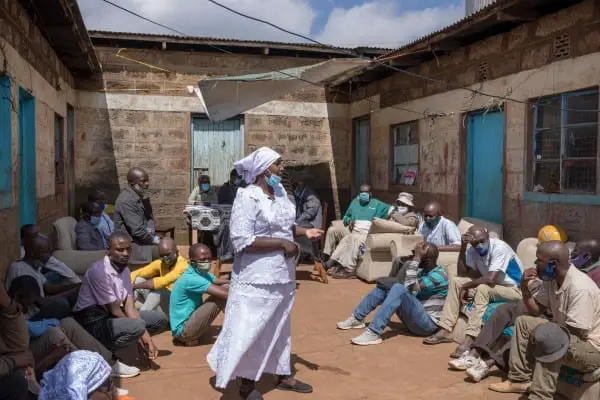This page contains affiliate links. This means if you a follow a link and make a purchase, at no additional cost to you, Humanitarian Careers will receive a commission. Thank you for supporting the site.
Non-governmental organisations (NGOs) are independent organisations formed outside of governments or politics. They aim to deliver impartial aid to people in need. There are hundreds of NGOs in the world, from hugely famous international ones such as Save the Children, the International Rescue Committee and Médecins Sans Frontières, to small local ones.
Most people have heard of NGOs and have a general understanding of what they do. However, few people have thought about the vital role NGOs play globally. So, why are NGOs so important?
NGOs Fight To Reduce Poverty
A first reason why NGOs are important is because they work to end poverty around the world.
Globally, 689 million people live in extreme poverty – defined as living on less than 1.90 USD a day. People living in poverty often have poor life outcomes, lack good livelihoods, and cannot access adequate shelter, education, and healthcare. Poverty is also notoriously hard to get out of, with many caught in what is known as the ‘poverty trap’. NGOs do vital work helping to lift people out of destitution.
Many poor countries lack the financial and material resources needed to help their poverty-stricken populations. NGOs can be critical in providing basic services where the state is unable to. Without NGOs, millions of people around the world living in poverty would not have their basic needs met. This is a key reason why NGOs are so vital.
NGO’s have for many years been working to reduce poverty around the world. As well as international organisations there are also a huge number of smaller local NGOs that do vital poverty reduction work in many countries.
They Help People Affected By Disasters
A second reason why NGOs are important is because they assist people affected by disasters.
Millions of people each year have their lives impacted by disasters. Earthquakes, floods, famines, and extreme weather all cause extensive death and destruction. Communities hit by disasters can struggle to recover as people’s agriculture and livelihoods are destroyed, as well as key infrastructure like roads, communication networks and water supplies. NGOs are important because they provide vital aid to disaster hit communities.
As with poverty reduction, often poor countries lack the means to provide assistance when disasters hit. Both international and local NGOs step-in to help people recover from a disasters, especially when the state is unable to do so. NGOs also play an important role in helping communities prepare for disasters – aiming to limit the deaths, damage and disruption caused by future crises.
Without NGOs, many disaster hit communities would fail to recover. This shows the vital role that NGOs play.
NGOs Provide Aid To Refugees
A third reason why NGOs are important is because they provide vital assistance to refugees and displaced people.
The United Nations estimates there are over 75 million displaced people in the world. This combines the number of refugees – people who cross a border to flee conflict or persecution, and internally displaced people (IDPs) who had to flee their homes but remain within their country. The number of displaced people in the world is almost the highest it has ever been. NGOs play a key in helping many of these people.
When people flee their homes, they often take almost nothing with them. They also lose their house, as well as their business or job. Refugees often need healthcare, as well as education, shelter, clean water, food, and the chance to build a new livelihood. The majority of refugees in the world are hosted in many the poorest countries. NGOs are needed to give aid to refugees because many host country governments cannot.
The assistance NGOs give to refugees around the world is a big reason why they are so important.
NGOs Advocate For Systemic Change
Another reason why NGOs are important is because they advocate long-term and system changes.
Many NGOs provide urgent assistance to people in need around the world. However, this does not address the root causes of the many reasons why people are living in poverty or are vulnerable to disasters or conflicts. This is why NGOs undertake advocacy – campaigning for systemic changes that can address the underlying issues that cause poverty, wars and crises.
Advocacy is a key part of what many NGOs do and is why they are so important. NGOs are independent of governments or politics – this makes them uniquely placed to lobby on behalf of vulnerable groups. It also gives them a respected voice that allows them to raise public awareness on many issues.
NGO advocacy has many major successes over the decades. Landmine and cluster munition bans, as well as enshrining the rights of children and people with disabilities in international law are just some examples of major changes that have happened because of advocacy done by NGOs. They also show the importance of the work that NGOs do.
NGO Online Courses
If you want to know more about why NGOs are important, we highly recommend the online course Introduction to NGO Management. It goes over how NGOs operate and introduces students to the unique aspects of the NGO sector. Follow the link for more information.
Another online course we highly recommend for those wanting to know more about NGOs is How To Design and Fund International Development NGO Projects. Anyone working for an NGO needs a basic understanding of how NGO projects are set-up, and how to input to funding proposals. Click the link to get more information on the course.
If you are looking to work for an NGO, we highly recommend the online course International Humanitarian and Development Careers. We think it provides one of the best overviews of the NGO sector and gives a clear breakdown of the skills needed to get an NGO job. It also provides valuable information on how to successfully apply for positions within NGOs. Click the link to be taken to the course’s page.
They Water Provide Clean Water And Sanitation To People In Need
A further reason why NGOs are important is because they help people in need access clean water and sanitation.
UNICEF estimates there are 2.2 billion people in the world who do not have clean water. A lack of clean water can cause enormous health risks. People who do not have ready access to clean water must also often travel far to get it, limiting their ability to be economically productive. Many people living in extreme poverty, or affected by conflicts or disasters, do not have access to clean water and NGOs play a vital role in remedying this.
As well as needing access to clean drinking water, proper sanitation is also vital for people to live healthily. NGOs are important because they assist people living in destitution in poorer countries, as well as those experiencing humanitarian crises, to have proper sanitation.
Without NGOs, many more people would catch diseases and become ill due to poor sanitation. This is why NGOs are so important.
Millions Of Children Receive Education From NGOs
One reason why NGOs are so vital is because they play an important role in providing education to millions of children around the world.
There are over 58 million children around the world who do not have access to education. In poorer countries, the state is often unable to adequately fund schools, meaning many children either go without, or receive a poor standard of education. NGOs are critical because they often provide schooling in areas where the state is unable to. They also give vital advice, and additional funds, to improve schooling in many poorer countries.
As well as helping improve access and quality to education for children in lower income countries, NGOs are important because they set-up and run schools for children affected by conflicts and disasters. When communities are hit by humanitarian crises, children almost always lose access to education. NGO’s run effective projects allowing many of these children to continue their schooling. This is another key reason why NGOs are so vital.
NGO’s Provide Emergency Shelter
NGOs are important because they provide shelter to people facing humanitarian emergencies.
Disasters, such as earthquakes, floods, and extreme weather, cause widespread damage and destruction. Many people lose their homes when disasters hit. NGO’s play a vital role in ensuring that people experiencing crises have shelter.
NGO’s provide funds and materials to set-up emergency shelters during humanitarian crises. They also give people vital materials to help them rebuild their houses. Without NGO’s, many communities hit by disasters would continue to have major housing issues. Often poorer countries are unable to provide shelter in crises hit areas. This is why NGO’s often step-in to ensure people do not die from exposure or become ill due to lack of shelter. It’s also a major reason why NGOs are so important.
As well as providing emergency shelter for people during humanitarian crises, there are also NGOs that help to improve housing for people living in extreme poverty. This is a further reason why NGO’s are vital.
NGOs Work To Improve Childhood Nutrition
A reason why NGOs are vital is because they work to improve the nutrition of children in crisis zones and living in poverty around the world.
Millions of children globally struggle to get the nutrition they need. This could be due to the mother being unable to breast feed, a lack of powdered baby formular or an overall lack of food. Famines are a key cause of childhood malnutrition, but so is poverty, conflict, and other disasters.
Perhaps one of the most important things NGOs do is run childhood nutrition projects. Without NGOs, millions of children around the world would die, or have lifelong health issues due to severe malnutrition.
There are many NGOs, both local and international, that specialise in child nutrition. The work they do is vital in responding to crises faced by children.
NGOs Provide Healthcare To People In Need
NGOs are important because they provide medical assistance to people living in poverty and those affected by humanitarian crises.
Poorer countries lack the resources to run high quality healthcare systems. In many countries people are also too poor to pay for healthcare themselves. This means millions of people around the world struggle to get the medical attention they need. Across the world NGO’s run medical projects which allow people living in destitution to receive basic medical care. This is much needed and is one reason why NGOs are so important.
Alongside providing medical care to people living in poverty, NGOs also set-up emergency health facilities following disasters or to help those affected by conflicts. Many NGOs specialise in deploying full-scale medical facilities into disasters zones and are responsible for saving many lives. This further shows the importance of NGOs.
Without NGOs, many people living in poorer countries or affected by crises would go without medical care. This is why they are so vital.
They Build Local Capacity
Another reason why NGOs are critical is because they help build the capacity of local organisations so they can better respond to crises.
A growing part of many NGO’s mandates is capacity building. This is where larger NGO’s, usually international ones, partner with and train local actors. The aim is to increase the capacity of local organisations. This will decrease their reliance on international assistance and help them to utilise more local talent and resources.
In recent years capacity building has become a more important part of what NGOs do. There is an acceptance that the aid sector can no longer rely on flying staff and equipment around the world to respond to crises, but also that local people are better at addressing their own crises. Providing support to local responders is a vital part of what many NGOs do.
NGOs Provide Quality Jobs
A perhaps lesser-known reason why NGOs are important is because they provide good jobs often in areas with few employment opportunities.
NGOs operate in areas of extreme poverty and crises. In order to deliver projects, they must hire large numbers of local staff. Although many NGOs deploy teams internationally, these are often limited to senior management roles. The vast majority of staff recruited by any NGO will be nationals of the country the NGO is working in.
In areas they work, NGOs are often one of the best employers. They recruit a range of jobs, from logistics and finance staff, to housekeepers and drivers. They provide steady employment and fair wages to many people. This not only benefits NGO workers and their families but also provides a significant economic boost to the community. This is a major reason why NGOs are important.
As well as providing good jobs to people, NGOs also stimulate the local market by procuring much of their supplies locally, as well as hiring guesthouses, offices, and vehicles. This further shows the vital role NGOs can play.
They Promote Human Rights
A final reason why NGOs are important is because they promote human rights.
Every human being on earth as unalienable rights. These are enshrined in international law and every country in the world is supposed to uphold them. However, in many places, people face persecution and violations of their basic human rights.
NGOs play a vital role in not only promoting human rights, but also highlighting human rights violations and helping to hold regimes that violate human rights to account. Their unique position as being independent from governments or politics allows NGOs to shine a light on issues that many other organisations could not. This includes drawing attention to human rights abuses and campaigning for better respect for human rights around the world.
There is a huge amount of important work that NGOs globally. Promoting human rights is perhaps one of the most vital.
If you want to know more about why NGOs are important, explore our page on the top NGO online courses here.





